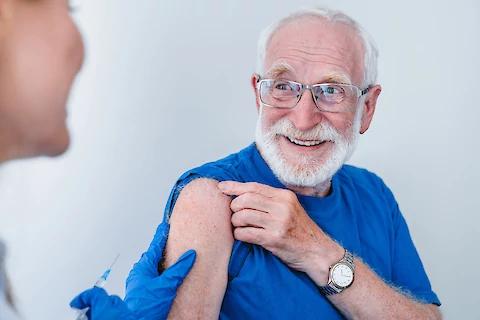
What Symptoms to Expect From the Flu Shot (And How to Treat Them)
Seniors aged 65 and above are more susceptible to Influenza, which may later cause complications. The CDC recommends taking the flu shot once a year as they are designed to boost the immune system.
These shots are categorized into the high-dose flu vaccine and the adjuvanted vaccine. The high-dose flu vaccine contains increased amounts of antigen, while the adjuvanted flu vaccine uses an added ingredient, known as an adjuvant, to trigger a stronger response. The latter is specifically designed for people 65 years and above.
Although the flu shot is generally not associated with major or lethal side effects, seniors may experience some mild symptoms. However, they should not discourage anyone from getting the shot since they can be avoided and treated easily.
Side Effects To Expect From The Flu Shot
Mild Side Effects
Some of the common mild side effects of the flu vaccine include:
- Soreness, redness, or swelling at the injection site: This should go away within a few days.
- Muscle aches, headaches, and fatigue: Seniors may also experience some of these symptoms after the flu jab; however, they should not last more than two days.
- Chest and abdominal pain: It is an immune reaction to the vaccine, known as a "vaccine reaction.'' The reaction can be mild or severe, depending on the senior's immune system.
- Nausea: This can result from either the body's reaction to the vaccine or the preservatives used to extend the vaccine's shelf life.
Painkillers such as ibuprofen or acetaminophen help relieve the mild side effects after getting the flu shot. Seniors should also stay hydrated and get plenty of rest to recover faster.
Severe Side Effects
Although rare, seniors may experience allergic reactions from the flu shot. They may manifest as hives, breathing difficulty, swelling of the face and throat, or dizziness. One should seek medical attention immediately if one experiences any of these symptoms.
How To Reduce the Side Effects of the Flu Shot
After the flu shot, seniors may experience some discomfort, but there are steps they can take before and after the shot to minimize the pain.
Before the Shot:
- Take deep breaths. This helps relax the muscles, including the arm muscles.
- Ease the mind. If afraid of injections, look away when the jab is being administered.
- Choose wisely. Seniors should ask their healthcare provider to administer the shot on their non-dominant hand. That way, the primary hand will not hurt as much as they go about their daily activities.
After the Shot:
- Apply pressure. Compression can help reduce inflammation at the site of injection.
- Use cold and warm compresses if there is swelling at the injection site. Ice helps reduce swelling; a warm compress helps relax the arm and increase blood circulation.
Senior Helpers Of Knoxville: Your Trusted Senior Care Provider
Some seniors may feel anxious or afraid of getting a flu shot due to past negative experiences with injections or a fear of needles. It can be helpful for seniors to know the symptoms they may experience after getting the flu shot. Knowing what to expect can help seniors feel more at ease and prepared for the shot. It's important to remember that the flu shot is a safe and effective way to help protect against the flu and that the benefits of getting the flu shot far outweigh any potential discomfort.
Senior Helpers of Knoxville offers assisted living services such as personal care, transitional care, and companion care services to seniors in Knoxville, Maryville, Clinton, Loudon, and its environs. Our caregivers can assist seniors in getting their flu shots by coordinating with their healthcare providers and helping to arrange transportation to and from the appointment if necessary. We also offer specialized care for seniors with Parkinson's, Alzheimer's, or dementia.
Contact us today to know how our in-home services can benefit a senior loved one.